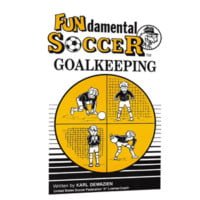Routines or Not?
Championing the Use of Routine
Routines, Rituals, and Performin Under Pressure
How many times have you heard that children need a routine?
Successful Youth Coaches, Child-Psychologists, Pediatricians, Mothers-in-law, Teachers, and Friends can tell you the importance of routines in children’s lives. So what’s the big question?
Are routines really that necessary for young players?
Simply put, YES!
Routines involve repetition. Repetition involves predictability. Predictability involves stability. Stability involves security. Young players crave routines because a routine makes young players feel safe and secure. On a very basic level (keeping in mind that is how young players function) routines reassure young players that their needs will be met. Routines also provide opportunities for young players to experience success in what they are doing, which then promotes self-control and self-esteem.
Routines and schedules help young players make sense of their practices – they know what to expect. This reduces anxiety and apprehension and allows for more time to enjoy practices and learn from their surroundings instead of stressing out about them.
Sean McCann, Ph.D.; U.S. Olympic Committee Performance Services, Sport Psychologist wrote an article entitled, “Routines, Rituals and Performing Under Pressure” in which he strongly advocates the use of ‘Routines’ because of ‘Routines’ help athletes:
Routines Increase Consistency
“We are what we repeatedly do. Excellence, then, is not an act, but a habit.” – Aristotle
Routines have been studied by sports psychologists for a long time, and there is good evidence that routines increase the consistency of an athlete’s thinking, feelings, and sport behavior. Because of these effects, routines also produce more consistent sport behavior. This produces better results. Routines, therefore, can make you a better athlete. There are a number of reasons why routines work, but you may find that many of your athletes resist routines. At the USOC, I have heard all sorts of reasons for this resistance, including:
“It’s Boring!”
“It slows me down”
“I don’t want to get locked into anything”
“I like being flexible in case things change”
“I used to do it, and it was helpful, but I just stopped. I’m not sure why.”
My personal opinion is that many athletes don’t develop effective routines simply because nobody ever taught them how important and helpful they are.
As a coach, you need to develop a sales pitch that gets past initial resistance and makes a compelling argument for change. One tactic is simply to list all the things that routines do for you, by both ensuring good things happen and preventing bad things from happening.
An argument can be made that a coach will end up using a great deal more energy if they don’t help athletes develop great routines. An initial investment of energy in developing good habits will create a great return down the road. I see this all the time in sports, and I’ll never forget what a great coach once said to me. “Why are all these coaches screaming from the sideline? If they had done their job in practice, they wouldn’t have to say anything during a game.” If a coach develops great routines, and the athletes develop great habits, then the habits make them great players.
Routines Help Athletes do the Right Thing
A routine increases the sense of familiarity in a new environment. Routines are portable, transferable, and adaptable. Remind your athletes that an iPod and headphones can mentally transport you from a treadmill in a hotel basement to a familiar run in the woods when you last listened to this music. Similarly, a routine can make even the strangest sports environment seem normal, familiar, and most importantly, comfortable. This is a powerful effect when the environment of the competition is full of distractions. I cannot overemphasize how helpful this has been to countless Olympic medal winners I have known when faced with the circus of the Games.
Routines Help to Prevent Dumb Mistakes
Under greatest pressure, athletes begin to leak energy and become more vulnerable to a variety of distractions and challenges. When an athlete is preparing intently for key performance, the last thing they should be doing is making critical decisions. Unfortunately, I have seen Olympic medals lost by athletes who decide to try something new or do something new, based on a decision made under pressure. An effective routine keeps an athlete busy, productive, and reduces the probability that the athlete will make a bad call, making a mistake that they cannot recover from.
Routines Help Athletes Avoid Doing the Wrong Things
Routines help reduce thinking and decision-making. When an athlete is stressed, anxious, and concerned about outcomes (a typical state for many athletes at their biggest competitions), thinking often transforms to worry. In addition, decisions about simple things become overemphasized, and athletes will often freeze up, wasting valuable time as they agonize over which pair of shoes to put in their backpack. Athletes weighted down with worry or unable to make a decision are wasting energy. At big events, energy is a precious commodity. An effective routine eliminates decisions (because, if you always do it the same way, you don’t have to decide), and keeps an athlete too busy to think too much.
Routines Help Make Useful Behavior Automatic
Some psychologists believe that over 90% of our behaviors are automatic habits or unconscious, learned behavior patterns. This is why parents and first coaches in a sport play such a critical role in introducing positive behaviors. If you learn how to do something the right way at the beginning, you don’t have to fix mistakes later, because you always do it the correct way, without any conscious thought. John Wooden was famous for teaching his Freshman basketball players the correct way to put on socks and tie sneakers. As a coach, if you invest the energy at the front end, you have the opportunity to create a positive routine for your athlete’s entire career. These routines will become automatic and help the athlete avoid all kinds of challenges that many athletes struggle with.
Routines Help Reduce Thinking and Decision Making
When an athlete is stressed, anxious, and concerned about outcomes (a typical state for many athletes at their biggest competitions), thinking often transforms to worry. In addition, decisions about simple things become overemphasized, and athletes will often freeze up, wasting valuable time as they agonize over which pair of shoes to put in their backpack. Athletes weighted down with worry or unable to make a decision are wasting energy. At big events, energy is a precious commodity. An effective routine eliminates decisions (because, if you always do it the same way, you don’t have to decide), and keeps an athlete too busy to think too much.
Our brains have limited capacity. The remarkable increase in the number of accidents for people on cell phones is an example of this. Routines that take care of all the little things an athlete has to do to get ready, free up brain space to focus on the things that really matter. If you want to have an excellent warm-up, you must be fully focused on the warm-up, and not wondering about something left undone.
Routines Help Athletes Stay Active and Focused
One of the worst things an athlete can do in a high-pressure environment is to stop and think about it. At the Olympics, when I see an athlete starting to freeze up, glaze over, and think too much (usually about the dreaded “what ifs”), I will try to get them talking, moving, and laughing. Much better than this emergency interaction by a sport psychologist, however, is a routine that keeps an athlete moving, on a schedule, and focused on the things that help.
The Coaches Role in Building Routines
“Coach Shula had a very strict schedule in the last two days before the Super Bowl. He never let us go more than 2 hours without checking in for something. It helped us stay focused on the game.” – Larry Czonka, member of 1972 “Perfect Season” Miami Dolphins
“We first make our habits, and then our habits make us.” – John Dryden
While most coaches will not follow John Wooden’s example by teaching their athletes how to dress properly for practice, all coaches can benefit from understanding the value of this effort. By starting with the most basic aspects of a sport, and ensuring that athletes develop great routines, a coach begins to develop the foundation of great performances.
While it can take a tremendous investment of effort by a coach to develop new routines, the cost of not making this investment can be high. As the Larry Czonka quote suggests, Don Shula knew the cost of losing focus at the Super Bowl, and invested energy in creating a program that prevented that loss of focus.
On the other hand, an argument can be made that a coach will end up using a great deal more energy if they don’t help athletes develop great routines. As the John Dryden quote suggests, an initial investment of energy in developing good habits will create a great return down the road. I see this all the time in sports, and I’ll never forget what a great coach once said to me. “Why are all these coaches screaming from the sideline? If they had done their job in practice, they wouldn’t have to say anything during a game.” If a coach develops great routines, and the athletes develop great habits, then the habits make them great players.








